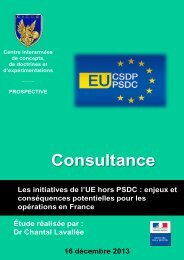Conference
science-research-bulletin-2013-conference
science-research-bulletin-2013-conference
You also want an ePaper? Increase the reach of your titles
YUMPU automatically turns print PDFs into web optimized ePapers that Google loves.
EUROPEAN POLICE SCIENCE AND RESEARCH BULLETIN<br />
SPECIAL CONFERENCE EDITION<br />
Amongst all, they have to deal with budget and<br />
human resources cuts and are simultaneously<br />
required to increase the quality of the service for<br />
the citizens. This doesn’t mean that a better police<br />
activity is always linked to more expenses and<br />
more staff, but the current need for an optimal<br />
use of public resources leads to crucial difficult<br />
choices and therefore it may lead to withdraw<br />
from some activities and priorities. All public<br />
demands cannot obviously be fulfilled under the<br />
given restrictive conditions.<br />
This structural lack of means makes us question<br />
the relevance of this notion of ‘accountability’<br />
(Skolnick and Fyfe, 1993, Walker, 2005). With fewer<br />
‘troops’, some demands have to be ignored, and<br />
citizens, or some of them will be disappointed or<br />
dissatisfied with the service offered by the police.<br />
Moreover, the concept of accountability has to<br />
be challenged in a centralised and hierarchical<br />
organisation. Who has decided where the cuts<br />
have to be done? It is very rare that the citizens<br />
are associated to this kind of decision. Whatever<br />
the budgets are, the leaders of the organisations<br />
are always reluctant to share their power with<br />
customers or citizens. Even if authorities promote<br />
accountability, it is hard for them to bring it<br />
into effect. Internal logics are more absorbing<br />
than citizens’ demands. And their plurality and<br />
diversity make them less coherent than clear top<br />
down style orders (Monjardet, 1996).<br />
As far as fairness is concerned, one could note<br />
that the pressure being put on police officers to<br />
be more efficient and more productive has led to<br />
limit the time available to listen to protagonists<br />
and resolve disputes. Patrols units have to go<br />
as quickly as possible from one intervention to<br />
the next one. Lacking the time needed to listen<br />
to all involved parties, the police do have less<br />
opportunity to find a suitable answer. In many<br />
police organisations oriented to efficiency,<br />
such an attitude, i.e. taking time for discussion,<br />
could be interpreted as a waste of time and<br />
energy. Zero tolerance policies have increased<br />
this trend to avoid the development of robust<br />
relationships with the public: because the police<br />
must address each incident as a problem and<br />
not as an occasion to interact with somebody,<br />
the police enter into a system of confrontation<br />
rather than cooperation. Therefore, fairness is<br />
hard to maintain.<br />
In many police organisations, all these<br />
contradictions would not be tackled Police<br />
officers on the beat are too much often the only<br />
who have to make choices. They have to take<br />
into account all constraints. But the worst thing<br />
is that police authorities are adding their own<br />
pressure over police officers in the street. As it was<br />
underlined above, the management produces<br />
regularly new rules in order to impose their view<br />
and their priorities. This phenomenon is not a<br />
new one: it is well known as the vicious circle<br />
of bureaucracy (Merton, 1940, Crozier, 1963).<br />
The procedures have to be followed by the civil<br />
servants. If they do, the social system becomes<br />
too rigid. It is impervious to external inputs. It<br />
they don’t, the organisation reacts in creating<br />
new rules and procedures. It has to be recognised<br />
that police organisation are often involved in such<br />
administrative mechanism. Many police officers<br />
complain about the pile of rules that they have<br />
to adhere to and apply. And at the same time,<br />
many others ask for more rules because they<br />
feel more comfortable with prescribed attitudes,<br />
which prevent them from taking too much<br />
responsibility.<br />
By adding internal rules on top of, or besides, the<br />
criminal code of procedure and other criminal<br />
laws, the police organisation is about to paralyze<br />
the whole system of policing. Of course, this<br />
paper is not defending non-ruled organisation<br />
of police forces. Relationships between policing<br />
and rules are quite a complex issue. Following<br />
Brodeur’s argument (Brodeur, 1984), one could<br />
argue that laws are anyway submitted to police<br />
organisations’ requirements. But with the piling<br />
up of new rules issued by diverse pressure groups,<br />
citizens, NGO’s, local elected authorities, it seems<br />
that police forces are no more able to cope with<br />
all rules, let alone to control them. And above<br />
all, there is a gap inside police forces themselves<br />
between backstage officers and street-level<br />
troops (see in detail Reuss-Ianni 1982). The latter<br />
are in favour of more rules in order to better<br />
control the former.<br />
THE UNINTENDED EFFECTS OF<br />
JUDICIALISATION<br />
Police forces are both a part of the judicialisation<br />
process and a victim of it. In our democratic<br />
societies, embedded in a customs’ pacification<br />
and civilisation process (Elias, 1974), conflicts<br />
and disputes are more and more solved through<br />
legal ways, with at least three impacts on police<br />
officers:<br />
27





